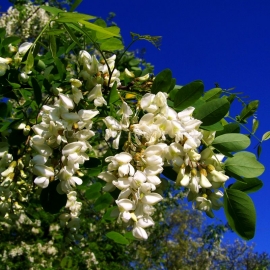




Organic Black Locust Seeds (Robinia Pseudoacacia)
1.14 €
Robinia pseudoacacia, commonly known as the Black Locust or False Acacia is a member of the pea family and has nitrogen-fixing bacteria on its root system; for this reason it can grow on poor soils and is an early colonizer of disturbed areas.
-
Organic Black Locust (Robinia Pseudoacacia)
Robinia pseudoacacia, commonly known as the Black Locust or False Acacia is a member of the pea family and has nitrogen-fixing bacteria on its root system; for this reason it can grow on poor soils and is an early colonizer of disturbed areas. It is native to the south eastern United States but has been widely planted and naturalised elsewhere in temperate North America, Europe, Southern Africa and Asia.
It is a medium sized tree, generally 12 to 18m (40 to 60 ft)and grows rapidly even in polluted city environments and produces a showy display of flowers that are both nectar bearing and fragrant and important for honey production in the eastern United States and Europe. It is also planted for firewood because it grows rapidly, is highly resilient in a variety of soils, and it grows back even faster from its stump after harvest. It also readily reproduces from suckers that can appear from parts of the root system, these can be rapid growing and very thorny.
The wood is extremely hard, resistant to rot and durable, making it prized for furniture, flooring, paneling, fence posts and small boats. False acacia is highly valued as firewood because it burns slowly, with little visible flame or smoke and is said to have a comparable heat content to anthracite coal.
The seeds do not have a long and complicated dormancy to break down. The seeds can easily be induced to grow by soaking in near boiling water. Following this treatment the newly plumped up seeds begin to germinate immediately and development is rapid.
Germination, Sowing and After Care Information sent with every order.
How to Grow
Although Robinia seeds have only a very shallow dormancy they have a very hard, water-impermeable seed coat and require pre-treatment for successful germination to occur. Without pre-treatment it is likely that 10% or less of the seeds will germinate.
A combination of a variety of seed pretreatments is usually necessary to make the seed coat permeable so that the seed embryo can take up water and begin to germinate.
The first (and easiest) method is place the seeds in a heat proof container and pour hot (not boiling!) water 70-80 degrees Celsius over them and leave them to soak for between 12-24 hours. Seeds that have been successfully pre-treated will have swollen to around 3 times their previous size. Remove all swollen seeds as these will be damaged by further pre-treatments. These can be sown immediately.
This hot water treatment can be repeated up to 3 times, making the water a little hotter each time. Seeds that remain small need to be dried for further treatment.
The remaining method is to physically breakthrough the seed coat by cutting or (k)nicking the edge of the seed with a knife or using a file or even rubbing them between layers of fine sandpaper. All of these methods can be used to break through the seed coat. Once you have done this soak the seeds in cold water for 12-24 hours and successfully treated seeds will have imbibed water and swollen greatly. Any that have not could be scarified again followed by another water soak. Sow all the seeds, even those that remain small as they may germinate much later (perhaps years later), the seeds are very long lived and can remain viable in the field for many years.
Sow in pots or seed trays of good quality compost at a depth of about 2 cm (just less than 1 inch) The seed usually germinates in under 4 weeks at 15-20°c. It is important that temperatures or not greatly higher than this or germination will be reduced. Seeds can also be sown in prepared seedbeds outside and can quickly develop into strong thorny seedlings.
Growth in the first year can exceed 60 cm and large seedlings can be planted in their permanent positions during the dormant season. Smaller seedlings may need another year of growth.
